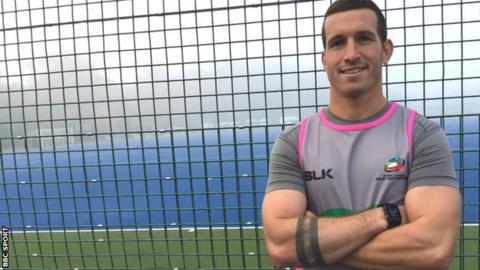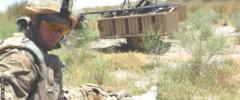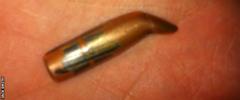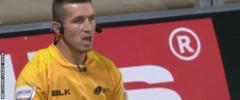Jack Smith: Four Nations role for ex-Royal Marine shot by a sniper in Afghanistan
- From the section Rugby League

"I could feel myself drifting away. I couldn't move. Blood was pouring out of my chest and I thought 'this is it'."
On
a foggy, cold and grey morning in Leeds, former Royal Marine and now
rugby league referee Jack Smith describes the moment he came to terms
with death six years earlier.He was shot by a Taliban sniper while serving in Afghanistan on 21 August, 2010. The bullet passed through his lower back, breaking ribs, hitting his liver, gall bladder, spleen, diaphragm and right lung before exiting his upper chest.
Lying flat on a roof at the time, he quickly rolled off the building to avoid further fire and broke even more ribs on impact.
"You lay there, your body shuts down and you don't think rationally," he said. "You think 'I'm going to sleep and that'll be it'.
"Looking back, if someone says 'you lay there and think you are going to die' you would think you would have some emotion.
"But with your body shutting down you really don't think about anything, you just want to close your eyes and go to sleep."
It was 21 days later in Birmingham's Queen Elizabeth Hospital that he opened his eyes. For him, it was a blink in time.
He awoke with family by his side and questioned why they were in Afghanistan.
"I just didn't get it. It took me four or five days to get my head around it," said the 27-year-old.
As Smith prepares to officiate in his first major international match, as touch judge for Friday's Four Nations opener between Australia and Scotland in Hull, he talks to BBC Sport about:
- The moment his fellow Marines rallied to save his life
- The breathless first steps in his recovery
- How he has since gone on to establish himself as one of Britain's finest referees
'A hole in my chest'

As he attempted to reiterate the message, the words escaped him. Then came a sharp pain in his chest.
"I had no breath because my lung had gone," he said. "When I pulled my body armour forward there was a 10cm x 10cm hole in my chest."
It was when Smith got into position on the roof top that the sniper took aim and hit his mark.
"When you lie down or crouch, the body armour lifts a tiny bit at the back," said Smith. "From 500 or 600 metres away, they only have a gap of a centimetre of two.
"If you want to go for vital organs, that is pretty much the only place they could have shot. They got it, so fair play to them."
'They kept me alive'

"You are well aware that if you have been shot up there, somebody's rifle is trained on that area," he said. "It wasn't a conscious thing to get off, it's part of your training.
"For the lads on the ground, the first thing they see is me tumble onto the ground with a big hole in my chest. They got to work on me and they are great at what they do.
"I can name 20 people who were there on the ground who contributed to saving my life. People who used themselves as a human shield as I was carried on a stretcher and normal 20-year-old lads that perform stuff on you to keep you alive - they do more trauma than a lot of surgeons would."
'Hold on'

He recalls one man in particular, Danny Green, holding his hand. The words of encouragement to retain consciousness were familiar.
"Keep your eyes open, squeeze my hand." They are the same words he uttered weeks earlier as close friend and fellow marine Matthew Harrison was killed.
"I'd been in the same situation Danny was in," said Smith. "You hold their hand, telling them to keep their eyes open, keep squeezing your hand.
"It was Danny doing it to me, but for whatever reason your body switches off."
Standing up again

The capacity of his left lung was enough to see him through.
"It was enough to power my body, to keep me alive when my right wasn't working," she said. "The surgeon said that if I was slightly less fit, a smoker and other various things, I would have passed away."
But he survived. And he has since thrived.
"I remember the first time I stood up with the help of a few physios. I stood for five seconds with two of them holding me and then slept for 12 hours because I was that tired."
With active duty no longer an option as he could not wear body armour - it would sit directly on scar tissue on his chest and back - he was medically discharged from the Royal Marines.
Within six months of his rehabilitation he was jogging and even went on to play golf for Great Britain.

The injuries and ongoing back pain caused by two slipped discs - the result of falling off the roof - meant he could not return to rugby league, which he played as a youngster.
Instead, the rugby league-mad lad from Wigan chose refereeing.
In September 2012, he attended his first coaching course; two years later during an academy match he impressed Steve Ganson - the former Super League referee who is now the Rugby Football League head of match officials - and in June he refereed his first Super League match.
Earlier in October he was added to the RFL's full-time panel of referees.
"There is a tremendous story that Jack has, but ultimately you have to detach yourself from that as a manager-coach and we have Jack in our group for the skills he has a rugby league referee," said Ganson.
"He is an unassuming bloke, but he is quietly determined. I'm hoping he will put one or two of my real top blokes under some pressure. I think he is determined to be successful and he has all the traits to do that."
'I'm a refereeing nerd'

"In the Marines you are training in -5C or -10C temperatures all the time. This is tropical at 3C or 4C," he said.
And with that, an insight into his military approach to refereeing.
"It's everything for me, my whole life," Smith said of being a Royal Marine. "When I joined at 17 or 18, it was lifestyle changing from being a boy to a man. It is embedded into everything I do.
"It helps me, especially on weekends when it's a high-pressure scenario or situation where someone might crumble or people might react differently."
His remarkable rise up the refereeing ranks is one that Smith has relished, but it is also one that he does not take for granted.
"If I can get a tiny bit of information from every single senior ref here for the Four Nations and use what I can, it will really improve me," said Smith.
"I'm well aware that I'm behind people with experience, so where I can read policies and rulings or group review notes, I will. For me, I've got to do stuff above and beyond other people to get to where I want because of my lack of time in the middle.
"I'm a refereeing nerd, which I never thought I'd be."

No comments:
Post a Comment